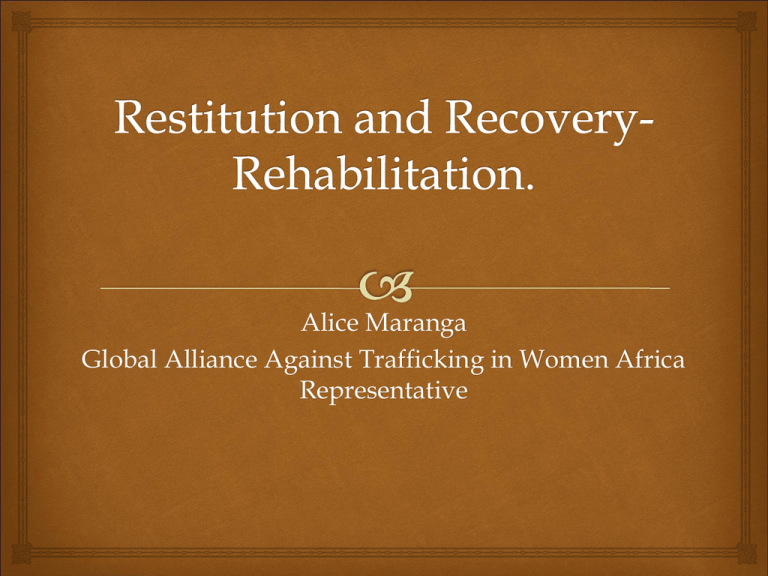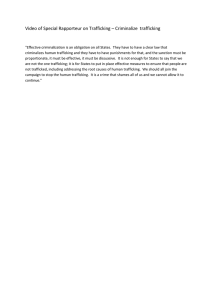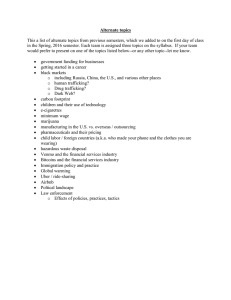Alice Maranga Global Alliance Against Trafficking in Women Africa Representative
advertisement

Alice Maranga Global Alliance Against Trafficking in Women Africa Representative About FIDA Kenya FIDA Kenya is a premier women’s rights civil society organization in the East Africa region. FIDA Kenya’s vision is to assist women access justice The strategic objective of the organization is to enhance knowledge management base for international, regional and national learning, programming benchmarking, legislation review, research, documentation and teasing out advocacy issues. About FIDA Kenya Continued FIDA Kenya has an observer status to the Economic Social Cultural Council( ECOSOC ). FIDA Kenya monitors government compliance to international human rights instruments that include; Convention on Elimination and Discrimination against Women ( CEDAW), Committee on the Status of Women (CSW), Universal Periodic Review (UPR), Convention against Torture (CAT) and African Commission on Human and People’s Rights. Defining Restitution and Recovery -Rehabilitation “Restitution of a trafficked victim aims at restoring the situation of the victim through necessary integration support. While recovery or rehabilitation for a trafficked victim include medical, psychological and social recovery. Restitution The UN Convention against Transnational Organized Crime (which addresses restitution for human trafficking) states: “1.Proceeds of crime or property confiscated by a State Party pursuant to articles 12 and 13, paragraph 1, of this Convention shall be disposed off by that State Party in accordance with its domestic law and administrative procedures.” Item 2 goes on to stipulate that: Restitution “When acting on the request made by another State Party in accordance with article 13 of this Convention, State parties shall, to the extent permitted by domestic law and if so requested, give priority consideration to returning the confiscated proceeds of crime or property to the requesting State Party so that it can give compensation to the victims of the crime or return such proceeds of crime or property to their legitimate owners. Restitution “In order to domesticate UN Protocol national laws in many countries will need to be revised in order to ensure that disposal of assets is done in a manner that benefits trafficked persons....Governments should not keep the assets for other purposes, and those that do are guilty of profiting from the traffickers’ criminal acts. Restitution- Human Rights Based Approach to TIP Human rights approach is based on the principle of peace, freedom, human rights and development. Human rights of women and children are the most violated rights. State parties should emphasize rights based approach as found in CEDAW by pointing out the trafficked persons’ legitimate claim to assets confiscated from the trafficker. Restitution- Right Based Approach to TIP The UN Trafficking Protocol’s restitution approach, provides no definite process as to how a female trafficking victim actually goes about recovering assets from her trafficker. The UN Protocol further demotes female victims’ rights by including the option of creating a law enforcement account with preference given to law enforcement efforts in developing and transition economies. These stipulations favor state agencies and law enforcement and cut female victims out of the legal process. Restitution- Right Based Approach to TIP While the law enforcement fund has notable benefits, the provision nonetheless begs the question of whether assets rightfully belonging to victims would be so easily redirected if trafficking were a crime affecting prominent men. In reality, of course, it primarily afflicts poor women. UN Trafficking Protocol hardly mentions the structural economic inequalities that create the endless supply of women vulnerable to the trafficking market in Africa, Eastern Europe, Asia and Latin America. Restitution- Right Based Approach to TIP The total neglect of the issue of demand in the UN Protocol on Trafficking in Persons suggests that the UN instrument lacks a viable remedy for the deeprooted causes of trafficking hence need for guiding principles to the Protocol. Recovery/ Rehabilitation Protection of trafficked person post identification State parties should provide protection to TIP victims; To receive adequate health and social services during the period of temporary residence ( in Shelter). To protect a victim identity To protect victims from intimidation, threats and reprisals from traffickers To provide psychological, material, educational assistance. Recovery/ Rehabilitation Recommended Civil justice procedures Trafficking victims are often stigmatized for their “immorality,” which is compounded by their problematic status as illegal migrants. African State parties should provide and consider; Legislation to combat trafficking in persons to include advisory committees and setting aside funds for victims Legalize Prostitution Victim impact statements Restitution with one stop center offering all serives Recovery/ Rehabilitation Exception from payment of court fees in civil cases by trafficking victims. Provision of appropriate services to offer support and protection of victim including repatriation between state parties. Conclusion Overall, the realities on trafficking in persons; women and children victims of trafficking in persons and the threats to their rights by and traffickers, clients and law enforcement alike should be the focus of major research, legislation and policy attention by African state parties. The Trafficking Protocol should consider crucial issues of human trafficking victim’s rights and gender equity and provide guidelines to the protocol. The End Thank you!




